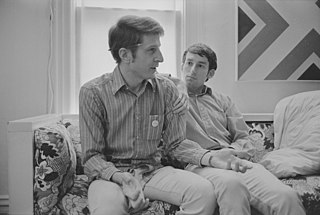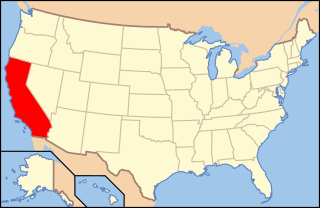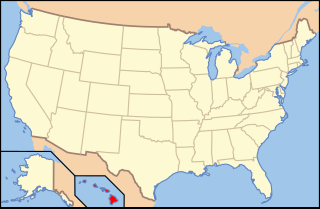History
Under the leadership of L.J. Carusone and Mark Levine, the Marriage Equality California Chapter was created. On February 14, 2000, at a protest in Beverly Hills, Marriage Equality California became one of the first marriage-equality organizations in the country to organize a "mass-marriage protest" at a city clerk's offices on Valentine's Day, a tradition that has continued every February and spread throughout the 58 counties of California and to New York City. [3] [4] Levine writes he:
promised the police and court officials that we would not be violent in any way. And court officials, in turn, graciously agreed to waive the marriage license fee, since we all knew they would reject our attempts to get married. I remember it was a beautiful day, and a joyful one: We all smiled ear-to-ear knowing we were attempting something that was then impossible but which every one of us thought would eventually become possible. [5] [6]
Marriage Equality California was entirely volunteer driven with no paid staff, and educated Californians through rallies & demonstrations, educational programs, outreach, and media representation.
From 1999 to 2002, Marriage Equality California was the primary advocate for marriage equality in California, and was an advocate for California Assembly bill 1338, California's first civil-unions bill and the second civil-unions bill in the nation after Vermont's. Introduced February 23, 2001, AB 1338 was the first law in the United States that would have given full state and federal marriage rights to gay and lesbian couples. (Vermont gave only state rights.) The original version of AB 1338 providing the option for same sex-couples in California to enter into a civil union after the original legislation, co-drafted by co-founder Mark Levine was withdrawn, according to him, for being too "pro-equality" for gay people. [7] [8] [9] [10]

A civil union is a legally recognized arrangement similar to marriage, created primarily as a means to provide recognition in law for same-sex couples. Civil unions grant some or all of the rights of marriage.
Same-sex marriage, also known as gay marriage, is the marriage of two people of the same legal sex. As of 2024, marriage between same-sex couples is legally performed and recognized in 36 countries, with a total population of 1.5 billion people. The most recent jurisdictions to legalize same-sex marriage are Greece and Aruba and Curaçao in the Netherlands. Two more countries, Liechtenstein and Thailand, are set to begin performing same-sex marriages in early 2025.

The availability of legally recognized same-sex marriage in the United States expanded from one state (Massachusetts) in 2004 to all fifty states in 2015 through various court rulings, state legislation, and direct popular votes. States each have separate marriage laws, which must adhere to rulings by the Supreme Court of the United States that recognize marriage as a fundamental right guaranteed by both the Due Process Clause and the Equal Protection Clause of the Fourteenth Amendment to the United States Constitution, as first established in the 1967 landmark civil rights case of Loving v. Virginia.
This is a list of notable events in the history of LGBT rights that took place in the year 2005.
A California domestic partnership is a legal relationship, analogous to marriage, created in 1999 to extend the rights and benefits of marriage to same-sex couples. It was extended to all opposite-sex couples as of January 1, 2016 and by January 1, 2020 to include new votes that updated SB-30 with more benefits and rights to California couples choosing domestic partnership before their wedding. California Governor Newsom signed into law on July 30, 2019.
Same-sex marriage has been legal in Vermont since September 1, 2009. The Senate passed same-sex marriage legislation on March 23, which the House of Representatives amended and approved by a 94–52 vote on April 3, 2009. Governor Jim Douglas vetoed the bill as promised on April 6. Both the House and the Senate successfully overrode Douglas' veto the following day. The law went into effect on September 1, making Vermont the fourth U.S. state to legalize same-sex marriage after Massachusetts, Connecticut, and Iowa, and the first to introduce same-sex marriage by enacting a statute without being required to do so by a court decision.
Same-sex marriage has been legally recognized in New Jersey since October 21, 2013, the effective date of a trial court ruling invalidating the state's restriction of marriage to persons of different sexes. In September 2013, Mary C. Jacobson, Assignment Judge of the Mercer Vicinage of the Superior Court, ruled that as a result of the U.S. Supreme Court's June 2013 decision in United States v. Windsor, the Constitution of New Jersey requires the state to recognize same-sex marriages. The Windsor decision held that the federal government was required to provide the same benefits to same-sex couples who were married under state law as to other married couples. Therefore, the state court reasoned in Garden State Equality v. Dow that, because same-sex couples in New Jersey were limited to civil unions, which are not recognized as marriages under federal law, the state must permit civil marriage for same-sex couples. This ruling, in turn, relied on the 2006 decision of the New Jersey Supreme Court in Lewis v. Harris that the state was constitutionally required to afford the rights and benefits of marriage to same-sex couples. The Supreme Court had ordered the New Jersey Legislature to correct the constitutional violation, by permitting either same-sex marriage or civil unions with all the rights and benefits of marriage, within 180 days. In response, it passed a bill to legalize civil unions on December 21, 2006, which became effective on February 19, 2007.
This article contains a timeline of significant events regarding same-sex marriage and legal recognition of same-sex couples worldwide. It begins with the history of same-sex unions during ancient times, which consisted of unions ranging from informal and temporary relationships to highly ritualized unions, and continues to modern-day state-recognized same-sex marriage. Events concerning same-sex marriages becoming legal in a country or in a country's state are listed in bold.
In response to court action in a number of states, the United States federal government and a number of state legislatures passed or attempted to pass legislation either prohibiting or allowing same-sex marriage or other types of same-sex unions.

The Uniting American Families Act is a U.S. bill to amend the Immigration and Nationality Act of 1952 to eliminate discrimination in immigration by permitting permanent partners of United States citizens and of lawful permanent residents to obtain lawful permanent resident status in the same manner as spouses of citizens and of lawful permanent residents and to penalize immigration fraud in connection with permanent partnerships. If the partnership ends within two years, the sponsored partner's immigrant status would be subject to review.

Equality California (EQCA) is a non-profit civil rights organization that advocates for the rights of LGBT people in California. It is the largest statewide LGBT organization in the United States and the largest member of the Equality Federation. The organization is based in Los Angeles.

Mark H. Levine is an American politician and attorney who served as the Delegate from the 45th District of the Virginia House of Delegates from 2016 to 2022. A member of the Democratic Party, he simultaneously ran for Lieutenant Governor of Virginia in the 2021 election and for reelection as a Delegate on June 8, 2021, but lost in the Democratic primaries to Hala Ayala and Elizabeth Bennett-Parker, respectively.

Molly B. McKay is an American attorney and a civil rights activist for lesbian, gay, bisexual and transgender individuals. McKay was the former Co-Executive Director of Marriage Equality California and the former Media Director for Marriage Equality USA. She has also been active in Californians for Same Sex Marriage and the California Freedom to Marry Coalition, and was the Associate Executive Director of Equality California. McKay married her longtime partner Davina Kotulski in 2004 when Gavin Newsom made same sex marriage legal for one day in San Francisco.
Marriage equality refers to the legal recognition of union between two persons without distinction as to their sex. See same-sex marriage.
Same-sex marriage has been legal in Guam since June 9, 2015 in accordance with a ruling from the District Court of Guam on June 5 that the territory's prohibition of same-sex marriage was unconstitutional. Guam was the first territory of the United States to recognize same-sex marriage. On August 27, 2015, the Guam Marriage Equality Act of 2015 passed by the Guam Legislature came into effect, officially incorporating the federal court ruling into statutory law.
The history of LGBT residents in California, which includes centuries prior to the 20th, has become increasingly visible recently with the successes of the LGBT rights movement. In spite of the strong development of early LGBT villages in the state, pro-LGBT activists in California have campaigned against nearly 170 years of especially harsh prosecutions and punishments toward gays, lesbians, bisexuals, and transgender people.

California is seen as one of the most liberal states in the U.S. in regard to lesbian, gay, bisexual, transgender, and queer (LGBTQ) rights, which have received nationwide recognition since the 1970s. Same-sex sexual activity has been legal in the state since 1976. Discrimination protections regarding sexual orientation and gender identity or expression were adopted statewide in 2003. Transgender people are also permitted to change their legal gender on official documents without any medical interventions, and mental health providers are prohibited from engaging in conversion therapy on minors.

The Marriage Equality Act is a 2009 Vermont state law which legalized the officiating of marriages between same-sex couples in the state. The law went into effect on September 1, 2009. Vermont became the fourth state to legalize same-sex marriage, the first to do so by legislation rather than a court ruling.

Equality Hawaii was a statewide political advocacy organization in Hawaii that advocated for lesbian, gay, bisexual, and transgender (LGBTQ) rights, including same-sex marriage.

Arnold Schwarzenegger was an early opponent of same-sex marriage in the United States, including during his Governorship of California. As an elected official he opposed legal recognition of same-sex marriage but otherwise he supported LGBT rights legislation, including civil unions.










